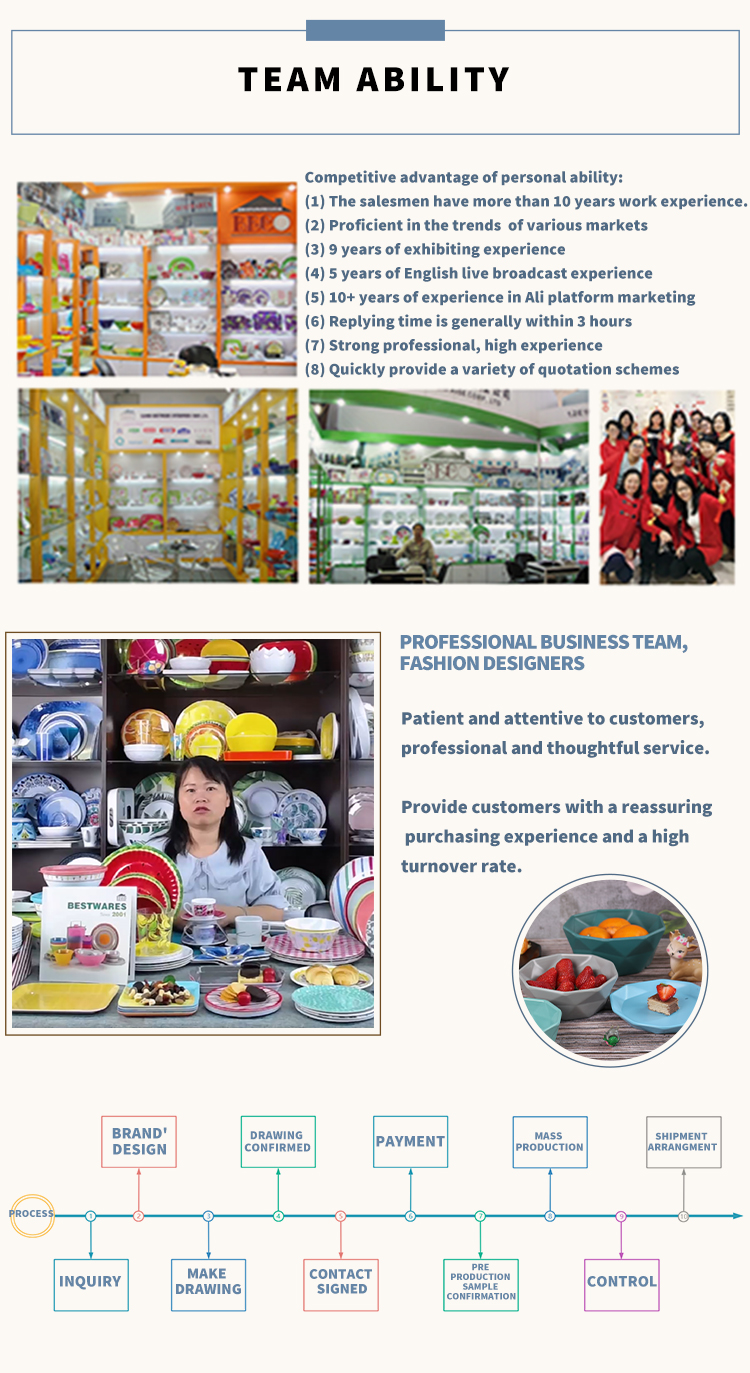As a B2B seller, aligning with manufacturers who prioritize environmental sustainability and social responsibility is increasingly important. In today’s market, customers are more conscious of the environmental impact of their purchases, making it essential for businesses to offer products that meet these expectations. This article explores the eco-friendly practices and social responsibility initiatives that reputable melamine dinnerware manufacturers should embrace.
1. Eco-Friendly Manufacturing Processes
1.1 Sustainable Material Sourcing
A key aspect of eco-friendly manufacturing is the responsible sourcing of materials. Reputable melamine dinnerware manufacturers should source raw materials from suppliers who adhere to sustainable practices. This includes using melamine that is BPA-free, non-toxic, and compliant with environmental standards, ensuring that the end product is safe for consumers and the planet.
1.2 Energy-Efficient Production
Energy consumption during production is a significant environmental concern. Manufacturers who invest in energy-efficient machinery and processes can reduce their carbon footprint. This includes using technologies that minimize energy use, reducing emissions, and adopting renewable energy sources such as solar or wind power in their manufacturing facilities.
1.3 Waste Reduction and Recycling
Minimizing waste is crucial for sustainability. Leading melamine dinnerware manufacturers implement waste reduction strategies, such as reusing or recycling materials within the production process. For example, scrap melamine can be repurposed for new products, reducing overall waste and conserving resources.
2. Eco-Friendly Product Design
2.1 Long-Lasting Durability
One of the most sustainable attributes of melamine dinnerware is its durability. By producing long-lasting products that resist breakage, stains, and fading, manufacturers help reduce the need for frequent replacements, which in turn minimizes waste. Durable products not only benefit the environment but also offer greater value to customers.
2.2 Minimalist and Recyclable Packaging
Sustainable manufacturers also focus on reducing the environmental impact of their packaging. This includes using minimalist packaging designs that require fewer materials, as well as opting for recyclable or biodegradable packaging materials. Reducing packaging waste is a simple yet effective way to enhance a product's sustainability.
3. Social Responsibility Initiatives
3.1 Fair Labor Practices
Social responsibility extends beyond environmental concerns. Reputable manufacturers ensure fair labor practices throughout their supply chain. This includes providing safe working conditions, fair wages, and respecting workers’ rights. Partnering with manufacturers who prioritize ethical labor practices helps uphold your business’s reputation and aligns with global standards for corporate social responsibility (CSR).
3.2 Community Engagement and Support
Many responsible manufacturers actively engage in their local communities through various initiatives, such as supporting education, health, and environmental conservation programs. By choosing manufacturers who invest in their communities, B2B sellers can contribute to broader social impact efforts, enhancing their brand's image and appeal to socially conscious consumers.
3.3 Transparency and Accountability
Transparency is a key element of social responsibility. Manufacturers who openly share information about their environmental practices, labor conditions, and community initiatives demonstrate accountability and build trust with their partners and customers. This transparency is crucial for B2B sellers who need to ensure that the products they offer meet ethical and environmental standards.
4. Benefits of Partnering with Eco-Friendly Melamine Dinnerware Manufacturers
4.1 Meeting Consumer Demand for Sustainable Products
Consumers are increasingly prioritizing sustainability in their purchasing decisions. By offering eco-friendly melamine dinnerware, B2B sellers can tap into this growing market demand, enhancing their competitive edge and driving sales.
4.2 Enhancing Brand Reputation
Aligning with manufacturers who prioritize sustainability and social responsibility strengthens your brand’s reputation. Customers are more likely to trust and support businesses that demonstrate a commitment to ethical practices and environmental stewardship.
4.3 Long-Term Business Viability
Sustainability is not just a trend but a long-term business strategy. Companies that invest in sustainable practices are better positioned to adapt to regulatory changes, mitigate risks, and ensure the long-term viability of their business.



About Us


Post time: Aug-30-2024